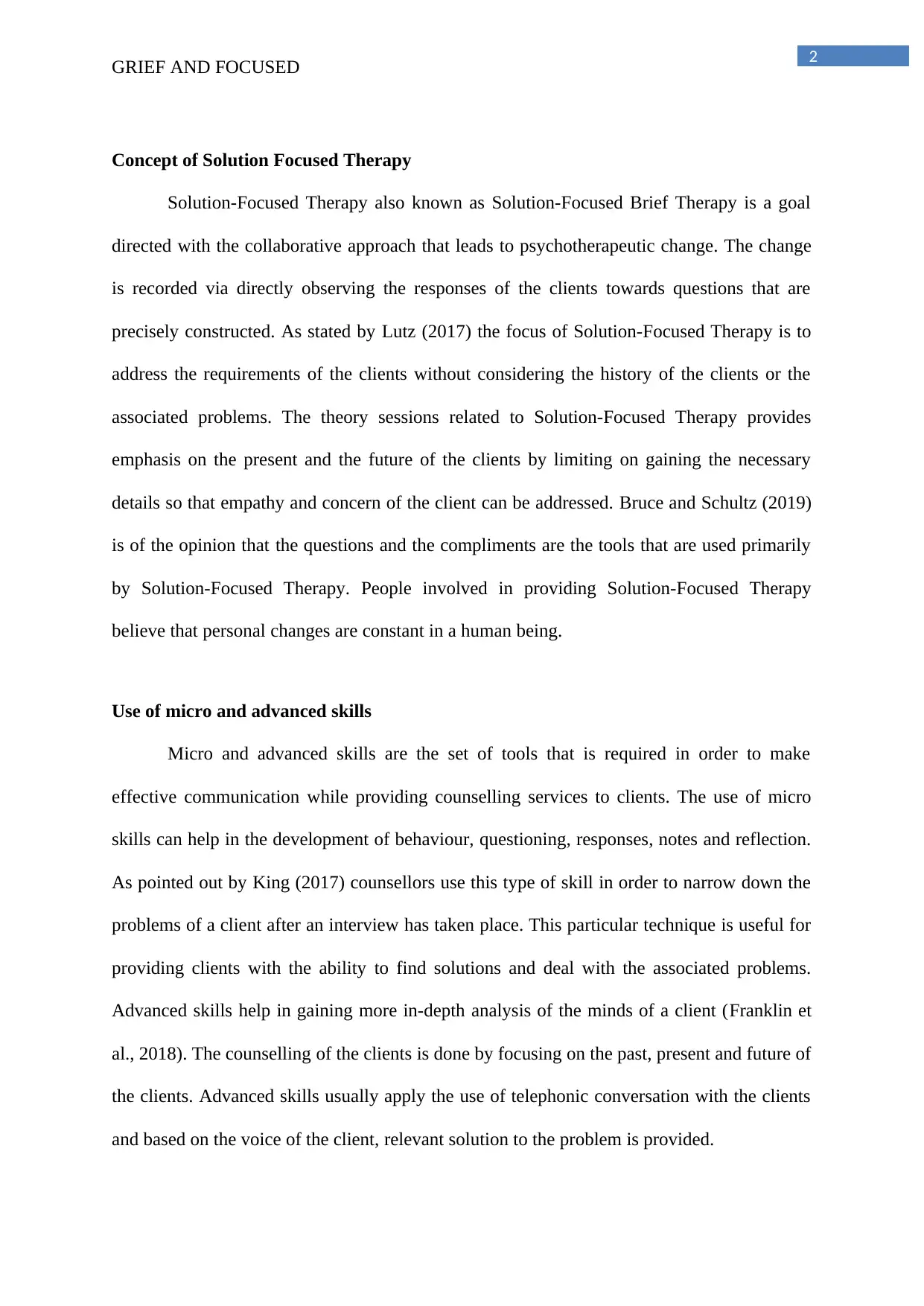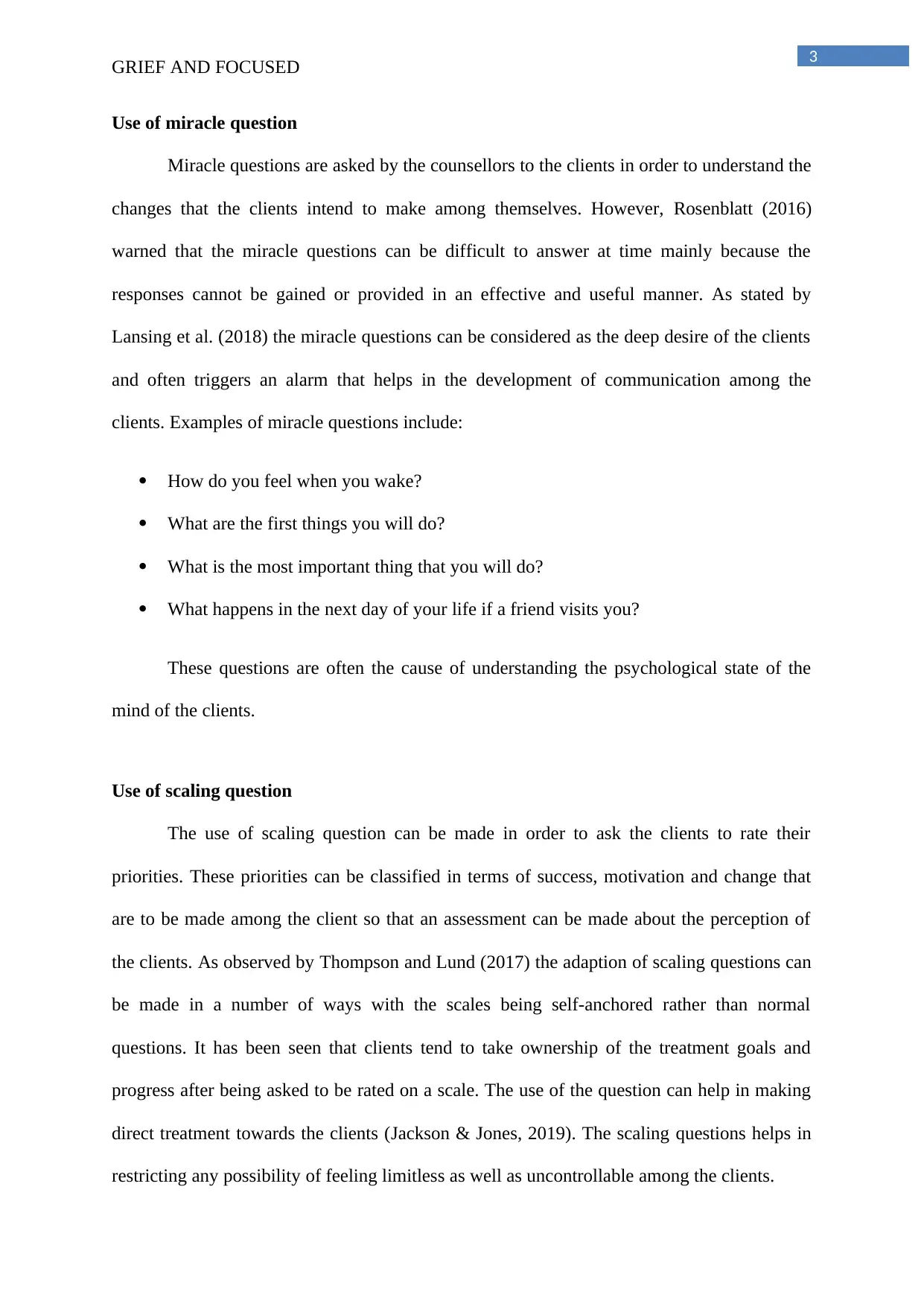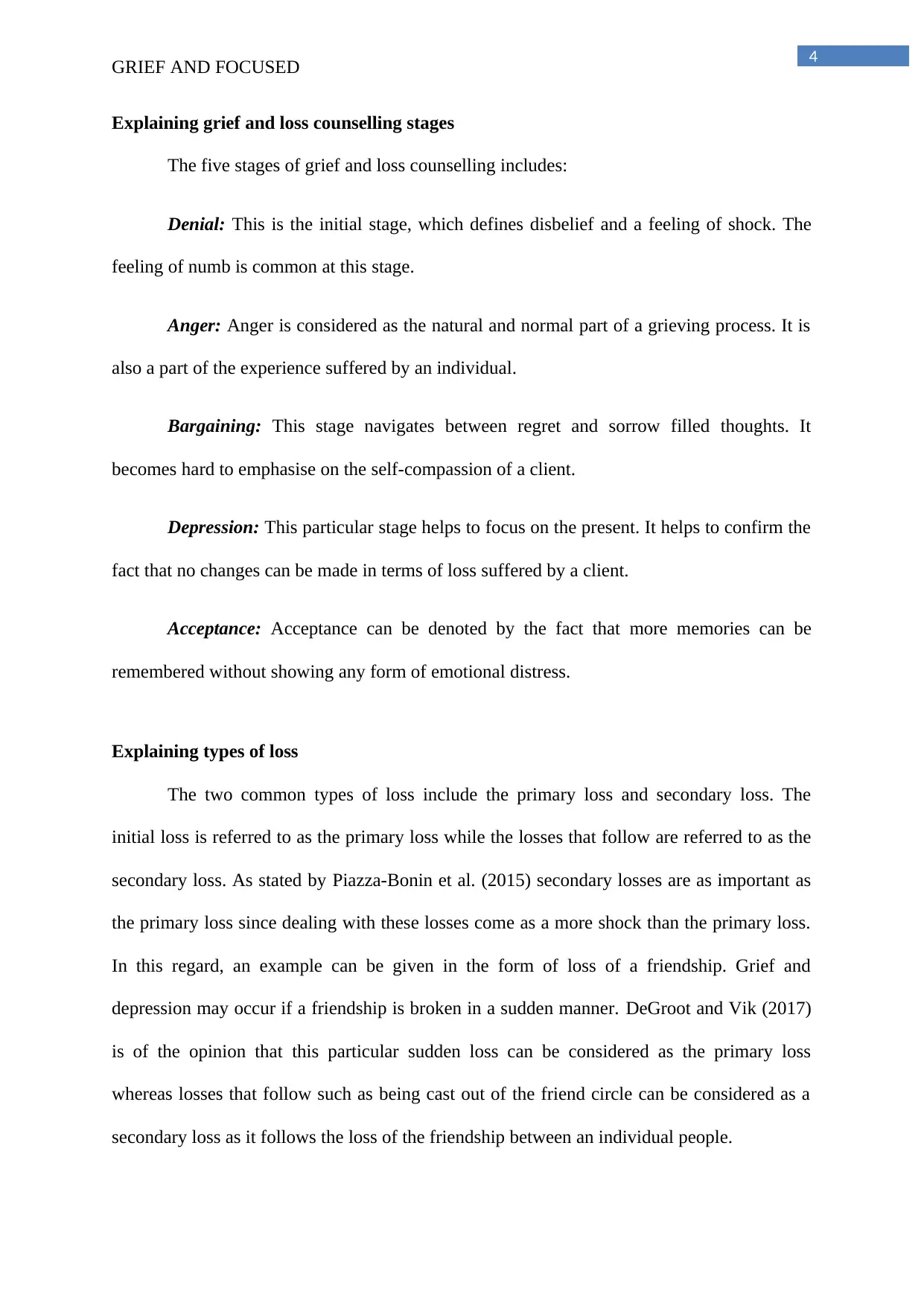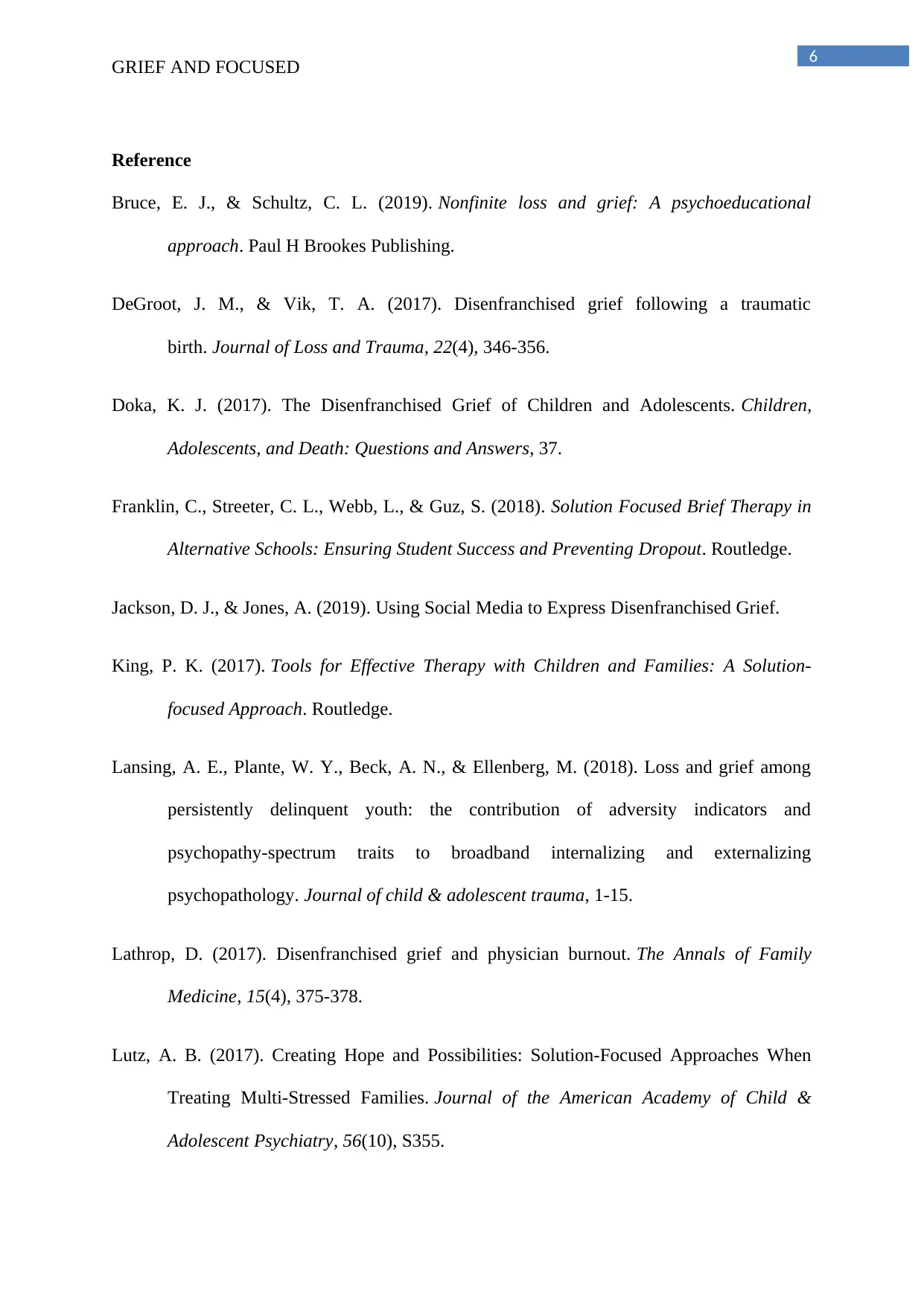Grief and Focused Therapy: Concepts and Techniques Report
VerifiedAdded on 2023/01/23
|8
|1594
|70
Report
AI Summary
This report delves into the realm of grief and focused therapy, also known as Solution-Focused Brief Therapy, a collaborative and goal-oriented approach to psychotherapeutic change. The report examines the core concepts of Solution-Focused Therapy, emphasizing its focus on the present and future while utilizing tools like micro and advanced skills to facilitate effective communication in counseling. It explores the use of miracle and scaling questions as valuable techniques to understand clients' needs and assess their progress. The report further outlines the stages of grief and loss counseling, distinguishing between primary and secondary losses, and provides insights into coping with disenfranchised loss. The student's work, available on Desklib, offers a comprehensive overview of the subject, including relevant references and practical applications for managing grief and loss.

Running head: GRIEF AND FOCUSED
Grief and Focused
Name of the Student
Name of the University
Author’s Note
Grief and Focused
Name of the Student
Name of the University
Author’s Note
Paraphrase This Document
Need a fresh take? Get an instant paraphrase of this document with our AI Paraphraser

1
GRIEF AND FOCUSED
Table of Contents
Concept of Solution Focused Therapy.......................................................................................2
Use of micro and advanced skills...............................................................................................2
Use of miracle question..............................................................................................................3
Use of scaling question..............................................................................................................3
Explaining grief and loss counselling stages.............................................................................4
Explaining types of loss.............................................................................................................4
Explanation and coping with disenfranchised loss....................................................................5
Reference....................................................................................................................................6
GRIEF AND FOCUSED
Table of Contents
Concept of Solution Focused Therapy.......................................................................................2
Use of micro and advanced skills...............................................................................................2
Use of miracle question..............................................................................................................3
Use of scaling question..............................................................................................................3
Explaining grief and loss counselling stages.............................................................................4
Explaining types of loss.............................................................................................................4
Explanation and coping with disenfranchised loss....................................................................5
Reference....................................................................................................................................6

2
GRIEF AND FOCUSED
Concept of Solution Focused Therapy
Solution-Focused Therapy also known as Solution-Focused Brief Therapy is a goal
directed with the collaborative approach that leads to psychotherapeutic change. The change
is recorded via directly observing the responses of the clients towards questions that are
precisely constructed. As stated by Lutz (2017) the focus of Solution-Focused Therapy is to
address the requirements of the clients without considering the history of the clients or the
associated problems. The theory sessions related to Solution-Focused Therapy provides
emphasis on the present and the future of the clients by limiting on gaining the necessary
details so that empathy and concern of the client can be addressed. Bruce and Schultz (2019)
is of the opinion that the questions and the compliments are the tools that are used primarily
by Solution-Focused Therapy. People involved in providing Solution-Focused Therapy
believe that personal changes are constant in a human being.
Use of micro and advanced skills
Micro and advanced skills are the set of tools that is required in order to make
effective communication while providing counselling services to clients. The use of micro
skills can help in the development of behaviour, questioning, responses, notes and reflection.
As pointed out by King (2017) counsellors use this type of skill in order to narrow down the
problems of a client after an interview has taken place. This particular technique is useful for
providing clients with the ability to find solutions and deal with the associated problems.
Advanced skills help in gaining more in-depth analysis of the minds of a client (Franklin et
al., 2018). The counselling of the clients is done by focusing on the past, present and future of
the clients. Advanced skills usually apply the use of telephonic conversation with the clients
and based on the voice of the client, relevant solution to the problem is provided.
GRIEF AND FOCUSED
Concept of Solution Focused Therapy
Solution-Focused Therapy also known as Solution-Focused Brief Therapy is a goal
directed with the collaborative approach that leads to psychotherapeutic change. The change
is recorded via directly observing the responses of the clients towards questions that are
precisely constructed. As stated by Lutz (2017) the focus of Solution-Focused Therapy is to
address the requirements of the clients without considering the history of the clients or the
associated problems. The theory sessions related to Solution-Focused Therapy provides
emphasis on the present and the future of the clients by limiting on gaining the necessary
details so that empathy and concern of the client can be addressed. Bruce and Schultz (2019)
is of the opinion that the questions and the compliments are the tools that are used primarily
by Solution-Focused Therapy. People involved in providing Solution-Focused Therapy
believe that personal changes are constant in a human being.
Use of micro and advanced skills
Micro and advanced skills are the set of tools that is required in order to make
effective communication while providing counselling services to clients. The use of micro
skills can help in the development of behaviour, questioning, responses, notes and reflection.
As pointed out by King (2017) counsellors use this type of skill in order to narrow down the
problems of a client after an interview has taken place. This particular technique is useful for
providing clients with the ability to find solutions and deal with the associated problems.
Advanced skills help in gaining more in-depth analysis of the minds of a client (Franklin et
al., 2018). The counselling of the clients is done by focusing on the past, present and future of
the clients. Advanced skills usually apply the use of telephonic conversation with the clients
and based on the voice of the client, relevant solution to the problem is provided.
⊘ This is a preview!⊘
Do you want full access?
Subscribe today to unlock all pages.

Trusted by 1+ million students worldwide

3
GRIEF AND FOCUSED
Use of miracle question
Miracle questions are asked by the counsellors to the clients in order to understand the
changes that the clients intend to make among themselves. However, Rosenblatt (2016)
warned that the miracle questions can be difficult to answer at time mainly because the
responses cannot be gained or provided in an effective and useful manner. As stated by
Lansing et al. (2018) the miracle questions can be considered as the deep desire of the clients
and often triggers an alarm that helps in the development of communication among the
clients. Examples of miracle questions include:
How do you feel when you wake?
What are the first things you will do?
What is the most important thing that you will do?
What happens in the next day of your life if a friend visits you?
These questions are often the cause of understanding the psychological state of the
mind of the clients.
Use of scaling question
The use of scaling question can be made in order to ask the clients to rate their
priorities. These priorities can be classified in terms of success, motivation and change that
are to be made among the client so that an assessment can be made about the perception of
the clients. As observed by Thompson and Lund (2017) the adaption of scaling questions can
be made in a number of ways with the scales being self-anchored rather than normal
questions. It has been seen that clients tend to take ownership of the treatment goals and
progress after being asked to be rated on a scale. The use of the question can help in making
direct treatment towards the clients (Jackson & Jones, 2019). The scaling questions helps in
restricting any possibility of feeling limitless as well as uncontrollable among the clients.
GRIEF AND FOCUSED
Use of miracle question
Miracle questions are asked by the counsellors to the clients in order to understand the
changes that the clients intend to make among themselves. However, Rosenblatt (2016)
warned that the miracle questions can be difficult to answer at time mainly because the
responses cannot be gained or provided in an effective and useful manner. As stated by
Lansing et al. (2018) the miracle questions can be considered as the deep desire of the clients
and often triggers an alarm that helps in the development of communication among the
clients. Examples of miracle questions include:
How do you feel when you wake?
What are the first things you will do?
What is the most important thing that you will do?
What happens in the next day of your life if a friend visits you?
These questions are often the cause of understanding the psychological state of the
mind of the clients.
Use of scaling question
The use of scaling question can be made in order to ask the clients to rate their
priorities. These priorities can be classified in terms of success, motivation and change that
are to be made among the client so that an assessment can be made about the perception of
the clients. As observed by Thompson and Lund (2017) the adaption of scaling questions can
be made in a number of ways with the scales being self-anchored rather than normal
questions. It has been seen that clients tend to take ownership of the treatment goals and
progress after being asked to be rated on a scale. The use of the question can help in making
direct treatment towards the clients (Jackson & Jones, 2019). The scaling questions helps in
restricting any possibility of feeling limitless as well as uncontrollable among the clients.
Paraphrase This Document
Need a fresh take? Get an instant paraphrase of this document with our AI Paraphraser

4
GRIEF AND FOCUSED
Explaining grief and loss counselling stages
The five stages of grief and loss counselling includes:
Denial: This is the initial stage, which defines disbelief and a feeling of shock. The
feeling of numb is common at this stage.
Anger: Anger is considered as the natural and normal part of a grieving process. It is
also a part of the experience suffered by an individual.
Bargaining: This stage navigates between regret and sorrow filled thoughts. It
becomes hard to emphasise on the self-compassion of a client.
Depression: This particular stage helps to focus on the present. It helps to confirm the
fact that no changes can be made in terms of loss suffered by a client.
Acceptance: Acceptance can be denoted by the fact that more memories can be
remembered without showing any form of emotional distress.
Explaining types of loss
The two common types of loss include the primary loss and secondary loss. The
initial loss is referred to as the primary loss while the losses that follow are referred to as the
secondary loss. As stated by Piazza-Bonin et al. (2015) secondary losses are as important as
the primary loss since dealing with these losses come as a more shock than the primary loss.
In this regard, an example can be given in the form of loss of a friendship. Grief and
depression may occur if a friendship is broken in a sudden manner. DeGroot and Vik (2017)
is of the opinion that this particular sudden loss can be considered as the primary loss
whereas losses that follow such as being cast out of the friend circle can be considered as a
secondary loss as it follows the loss of the friendship between an individual people.
GRIEF AND FOCUSED
Explaining grief and loss counselling stages
The five stages of grief and loss counselling includes:
Denial: This is the initial stage, which defines disbelief and a feeling of shock. The
feeling of numb is common at this stage.
Anger: Anger is considered as the natural and normal part of a grieving process. It is
also a part of the experience suffered by an individual.
Bargaining: This stage navigates between regret and sorrow filled thoughts. It
becomes hard to emphasise on the self-compassion of a client.
Depression: This particular stage helps to focus on the present. It helps to confirm the
fact that no changes can be made in terms of loss suffered by a client.
Acceptance: Acceptance can be denoted by the fact that more memories can be
remembered without showing any form of emotional distress.
Explaining types of loss
The two common types of loss include the primary loss and secondary loss. The
initial loss is referred to as the primary loss while the losses that follow are referred to as the
secondary loss. As stated by Piazza-Bonin et al. (2015) secondary losses are as important as
the primary loss since dealing with these losses come as a more shock than the primary loss.
In this regard, an example can be given in the form of loss of a friendship. Grief and
depression may occur if a friendship is broken in a sudden manner. DeGroot and Vik (2017)
is of the opinion that this particular sudden loss can be considered as the primary loss
whereas losses that follow such as being cast out of the friend circle can be considered as a
secondary loss as it follows the loss of the friendship between an individual people.

5
GRIEF AND FOCUSED
Explanation and coping with disenfranchised loss
Disenfranchised loss is usually acknowledged by the society. An example of such a
loss is the death of a friend or a loss of pet. As stated by Lathrop (2017) the dual process of
coping with such a loss can be stated by the application of the five stages of loss or by being
socially active so that the loss can be easily overcome. These two ways can help an individual
gain proper counselling service over dealing with the loss. Doka (2017) is of the opinion that
the disenfranchised loss can lead to social trauma among the people.
GRIEF AND FOCUSED
Explanation and coping with disenfranchised loss
Disenfranchised loss is usually acknowledged by the society. An example of such a
loss is the death of a friend or a loss of pet. As stated by Lathrop (2017) the dual process of
coping with such a loss can be stated by the application of the five stages of loss or by being
socially active so that the loss can be easily overcome. These two ways can help an individual
gain proper counselling service over dealing with the loss. Doka (2017) is of the opinion that
the disenfranchised loss can lead to social trauma among the people.
⊘ This is a preview!⊘
Do you want full access?
Subscribe today to unlock all pages.

Trusted by 1+ million students worldwide

6
GRIEF AND FOCUSED
Reference
Bruce, E. J., & Schultz, C. L. (2019). Nonfinite loss and grief: A psychoeducational
approach. Paul H Brookes Publishing.
DeGroot, J. M., & Vik, T. A. (2017). Disenfranchised grief following a traumatic
birth. Journal of Loss and Trauma, 22(4), 346-356.
Doka, K. J. (2017). The Disenfranchised Grief of Children and Adolescents. Children,
Adolescents, and Death: Questions and Answers, 37.
Franklin, C., Streeter, C. L., Webb, L., & Guz, S. (2018). Solution Focused Brief Therapy in
Alternative Schools: Ensuring Student Success and Preventing Dropout. Routledge.
Jackson, D. J., & Jones, A. (2019). Using Social Media to Express Disenfranchised Grief.
King, P. K. (2017). Tools for Effective Therapy with Children and Families: A Solution-
focused Approach. Routledge.
Lansing, A. E., Plante, W. Y., Beck, A. N., & Ellenberg, M. (2018). Loss and grief among
persistently delinquent youth: the contribution of adversity indicators and
psychopathy-spectrum traits to broadband internalizing and externalizing
psychopathology. Journal of child & adolescent trauma, 1-15.
Lathrop, D. (2017). Disenfranchised grief and physician burnout. The Annals of Family
Medicine, 15(4), 375-378.
Lutz, A. B. (2017). Creating Hope and Possibilities: Solution-Focused Approaches When
Treating Multi-Stressed Families. Journal of the American Academy of Child &
Adolescent Psychiatry, 56(10), S355.
GRIEF AND FOCUSED
Reference
Bruce, E. J., & Schultz, C. L. (2019). Nonfinite loss and grief: A psychoeducational
approach. Paul H Brookes Publishing.
DeGroot, J. M., & Vik, T. A. (2017). Disenfranchised grief following a traumatic
birth. Journal of Loss and Trauma, 22(4), 346-356.
Doka, K. J. (2017). The Disenfranchised Grief of Children and Adolescents. Children,
Adolescents, and Death: Questions and Answers, 37.
Franklin, C., Streeter, C. L., Webb, L., & Guz, S. (2018). Solution Focused Brief Therapy in
Alternative Schools: Ensuring Student Success and Preventing Dropout. Routledge.
Jackson, D. J., & Jones, A. (2019). Using Social Media to Express Disenfranchised Grief.
King, P. K. (2017). Tools for Effective Therapy with Children and Families: A Solution-
focused Approach. Routledge.
Lansing, A. E., Plante, W. Y., Beck, A. N., & Ellenberg, M. (2018). Loss and grief among
persistently delinquent youth: the contribution of adversity indicators and
psychopathy-spectrum traits to broadband internalizing and externalizing
psychopathology. Journal of child & adolescent trauma, 1-15.
Lathrop, D. (2017). Disenfranchised grief and physician burnout. The Annals of Family
Medicine, 15(4), 375-378.
Lutz, A. B. (2017). Creating Hope and Possibilities: Solution-Focused Approaches When
Treating Multi-Stressed Families. Journal of the American Academy of Child &
Adolescent Psychiatry, 56(10), S355.
Paraphrase This Document
Need a fresh take? Get an instant paraphrase of this document with our AI Paraphraser

7
GRIEF AND FOCUSED
Piazza-Bonin, E., Neimeyer, R. A., Burke, L. A., McDevitt-Murphy, M. E., & Young, A.
(2015). Disenfranchised grief following African American homicide loss: An
inductive case study. OMEGA-Journal of death and dying, 70(4), 404-427.
Rosenblatt, P. C. (2016). Parent grief: Narratives of loss and relationship. Routledge.
Thompson, N., & Lund, D. A. (2017). Loss, grief, and trauma in the workplace. Routledge.
GRIEF AND FOCUSED
Piazza-Bonin, E., Neimeyer, R. A., Burke, L. A., McDevitt-Murphy, M. E., & Young, A.
(2015). Disenfranchised grief following African American homicide loss: An
inductive case study. OMEGA-Journal of death and dying, 70(4), 404-427.
Rosenblatt, P. C. (2016). Parent grief: Narratives of loss and relationship. Routledge.
Thompson, N., & Lund, D. A. (2017). Loss, grief, and trauma in the workplace. Routledge.
1 out of 8
Related Documents
Your All-in-One AI-Powered Toolkit for Academic Success.
+13062052269
info@desklib.com
Available 24*7 on WhatsApp / Email
![[object Object]](/_next/static/media/star-bottom.7253800d.svg)
Unlock your academic potential
Copyright © 2020–2025 A2Z Services. All Rights Reserved. Developed and managed by ZUCOL.





